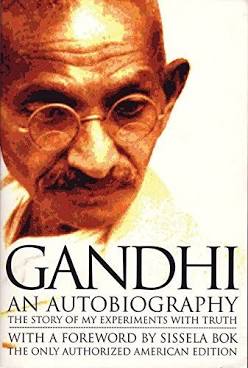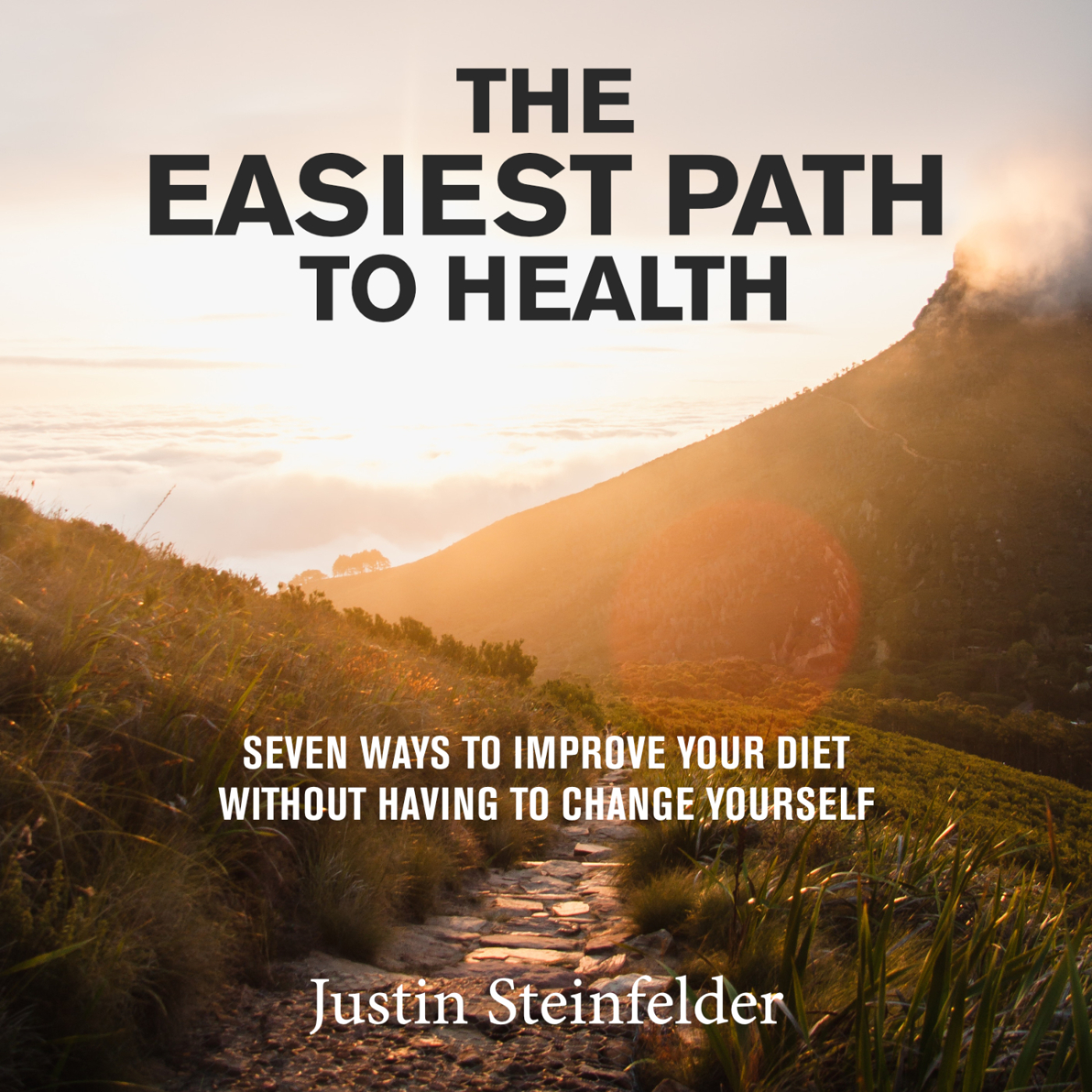Ok, maybe it isn’t quite the August Beach Reading season you were hoping for.
Usually, around this time of year, you’d head out to some mountain-front lake and shamelessly break out that teen fiction. Or perhaps you work up the courage to crack open that 700-page Chernow biography. But instead of sitting in some sandy oasis, you’re sitting on a lawn chair on your in-laws backyard with a plastic baby pool in 90% humidity.
Fortunately, one of the good things about books— maybe the best good thing— is that you don’t actually need to travel anywhere. The book does the traveling for you. As Stephen King says, books are “portable magic.” “To read,” Sagan wrote, “is to voyage through time.” Think of it as shrooms without the belly ache.
But a book can do more for you than just take you on an entertaining trip. It can teach you, embolden you, it can give you empathy and courage. And this teaching is in no way limited to nonfiction. As Neil Gaiman puts it:
“Fairy tales are more than true: not because they tell us that dragons exist, but because they tell us that dragons can be beaten.”
The creation of these different worlds and dragons is not at all limited to fiction– though fiction is one good route. Certainly, you can travel via The Little Prince or the Lighthouse. But you can also access other worlds through non-fiction accounts of cold-blooded killers or ground-breaking presidents. You can get there via biographies of a former first-lady or body-building governor. You can get there through histories of ideas or how one civilization came to dominate the world.
So, sit back on that 1980s, dusty, mothball infested couch, and open a up a book, on me. And try to— and I definitely invented this next phrase— find your beach.
The Stories
1. A Brief History of Nearly Everything, Bill Bryson.
Genre: Big History

“It is a slightly arresting notion that if you were to pick yourself apart with tweezers, one atom at a time, you would produce a mound of fine atomic dust, none of which had ever been alive but all of which had once been you.”
This one has been a long time coming.
I’ve been meaning to get into this book ever since I started really liking “Big History” books. (My introduction to the genre was Yuval Harari’s Coursera class —now on YouTube here). And Bryson continued the trend, providing not only a Harari-esque dazzling view of history, but coloring it with a laugh-out-loud, English wit (Bryson is American-born, but has lived in the UK for most of his life). The type of writing that had me pulling up amazon to purchase my next Bryson book.
One of the challenges of the humorist is to not let your comedy distract from clarity. Think of a Tonight Show style interview with Jim Carrey or Robin Williams and how the host struggles to get to any real answers. This becomes especially crucial when you are attempting to describe concepts as cumbersome to your basic audience as to scientists. Bryson executes this mix with devastating appeal and apparent ease. He makes astronomy and physiology not only accessible, but sort of hilarious.
He starts you in the unfathomable outer space, through the formation, and eventual population of the earth, and then through all manner of important discoveries— from the weight of the earth, through Newton’s Laws, the tectonic plates, and relativity, finally ending with Homo sapiens, and where we go from here.
Really, really fun.
2. Martin Dressler: The Tale of An American Dreamer, Steven Millhauser
Genre: Fiction (Pulizter Prize, 1998)
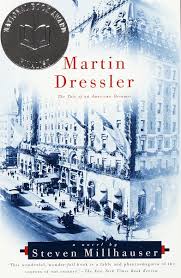
“There once lived a man named Martin Dressler, a shopkeeper’s son, who rose from modest beginnings to a height of dreamlike good fortune. This was toward the end of the 19th century, when on any streetcorner in America you might see some ordinary-looking citizen who was destined to invent a new kind of bottlecap or tin can, start a chain of five-cent stores, sell a faster and better elevator, or open a fabulous new department store with big display windows made possible by an improved process for manufacturing sheets of glass. Although Martin Dressler was a shopkeeper’s son, he too dreamed his dream, and at last he was lucky enough to do what few people even dare to imagine: he satisfied his heart’s desire. But this is a perilous privilege, which the gods watch jealously, waiting for the flaw, the little flaw, that brings everything to ruin, in the end.”
With perhaps my favorite opening lines in fiction history, Milhuaser— a former Skidmore writing professor— tells you exactly what happens in the entire novel, and makes it impossible not to want to see how it unfolds. It is the classic not what, but how, that becomes interesting. A Greek tragedy updated with a New York sheen.
The story is about just what it sounds like: Martin Dressler— just a kid at the books start, and his rise and fall in business and love, all set in the time of peak industrial revolution early 1900s New York City. Millhauser has the Salingerian ability to capture the oddity of very familiar moments, mannerisms, characters, and yet the book maintains a somehow distant and elusive Bronte-ish balance of hopeful idealism and irking melancholy.
I was in “the world” the entire time. I guess you could say that (another of my personally invented phrases) he had me at hello.
3. The Story of My Experiments with Truth, Mohandas Gandhi
Genre: Autobiography, History, Philosophy
“When every hope is gone, ‘when helpers fail and comforts flee,’ I find that help arrives somehow, from I know not where. Supplication, worship, prayer are no superstition; they are acts more real than the acts of eating, drinking, sitting or walking. It is no exaggeration to say that they alone are real, all else is unreal.”
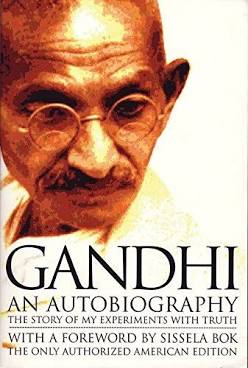
Same timeframe — early 1900s– and yet, it’s a completely different world. Not a world of ambitious dreams bringing about one’s downfall; but a world of aspiration, of dreams and conscience bringing about, not the soul’s destruction– but its construction. A vision of hope not driven by acquisition and lust, but by faith and love.
Jesus. Or maybe I should say, Krishna.
At some point last year, it dawned on me that in the early 1900s, there was a tiny little Indian man who, with the power not of arms, money, or men, but with mere ideals, grit, and love, freed a country of a billion people from the most powerful empire in the world. And that I knew absolutely nothing about him. After that, it was just a matter of time. Luckily, I had some help from my friend.
I’ve written about my little two-person book club with my buddy, Geremy. Well, in the beginning of the year, we read (and listened to) MLK’s autobiography. In that book, MLK makes so much reference to Gandhi, explaining how much hw was influenced by him, that it was obvious that we had to learn about Gandhi next.
We were both amazed. It’s hard to imagine someone existed like that. Like either of them. With the patience, the determination, the love, the power. They seemed to have the positive side of every good quality without the downside of it. And they seemed to relinquish their egos, and eventually their lives, for far greater causes.
As soon as was finished with Gandhi’s, Experiments with Truth, I watched the 1982 film directed by Richard Attenborough with Ben Kingsley staring as Gandhi (Kingsley won the ’82 Academy Award). It was inspiring and heart wrenching.
Whenever I despair, I remember that the way of truth and love has always won. There may be tyrants and murderers, and for a time, they may seem invincible, but in the end, they always fail. Think of it: always
At the end, as with MLK, I could do nothing else—I cried.
4. Open, Andre Agassi
Genre: Autobiography, Sports, Life
“This is why we’re here. To fight through the pain and, when possible, to relieve the pain of others. So simple. So hard to see.”
“Tennis is the loneliest sport”
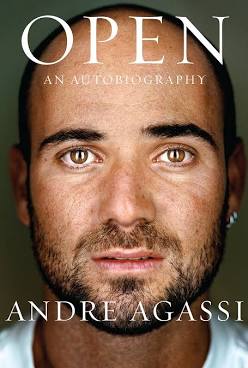
Growing up with a taller, more athletic, potentially better-looking older brother, and being the stubborn, competitive, identity-seeking young boy that I was, I always liked the opposite athletes as Jordy.
He liked the Cowboys, so I liked the Niners. He liked Bonds, my favorite was Ken Griffey. And in tennis, my boy was Sampras, his was Agassi (the only person we agreed on was, of course, MJ). Luckily, I’m so incredibly woke, that I learned to put our differences aside and asked if my brother wanted to read the Agassi autobiography together. He agreed.
ESPN’s Rick Reilly’s called Open the “most revealing, literate, and toes-stompingly honest sports autobiography of all time.” I think I agree. It’s good for several reasons. It was fun to relive the old tennis matches of the 90’s and early aughts. I read the chapter recounting the 1992 Wimbledon, where Agassi beat Boris Becker and John McEnroe on the way to defeating Goran Ivanisevic in the final, and then rushed to pull up the match highlights on YouTube. (Though, 1992 video is pretty terrible).
It was also well-written. You wouldn’t think of the formerly long-haired, tennis rebel to be such a literary nerd, but he is. It turns out, that was all just an outer shell. Agassi’s mind seems to be in line much more with an artist than an athlete.
And, as the title indicates, it is definitely a full-scale look into his interior. Although at times, you can’t tell if he’s aggrandizing, or over-selling, or fictionalizing, rather than telling the truth. But then, what writing of truth is 100% nonfiction? None that I’ve ever read.
Perhaps the least expected part of this book was the love story with him and Steffi Graf. That may have been my favorite thread throughout.
The book taught me that even the best ever—number 1 in the world— think they aren’t good enough. It taught me how people have to adapt, change, and reinvigorate their interests and goals at various ties throughout their careers. It talks on parenting, and love, and triumph and failure, and coaching, and learning and teaching.
“Points become games become sets become tournaments, and it’s all so tightly connected that any point can become the turning point. It reminds me of the way seconds become minutes become hours, and any hour can be our finest. Or darkest. It’s our choice.”
5. The Choice, Dr Edith Eva Eger
Genre: Memoir, History, Psychology, Philosophy
“We don’t know where we’re going, we don’t know what’s going to happen, but no one can take away from you what you put in your own mind.”

There’s a scene early in this book that captures (to the extent possible) the terror of being in a concentration camp as a young girl whose parents have been murdered by the Nazi’s and the possibility for escaping, for staying hopeful, even while standing in front of once of the camp’s most notorious killers.
It was Dr Eger, as a young girl standing in front of Dr Josef Mengele— also known as the Angel of Death for his role in deciding which Jews were sent to gas chambers. On those prisoners he let live, he performed various, tortuous experiments. A more menacing, terrorizing figure can hardly be imagined.
Dr. Mengele, with about as much despicability as can be stomached, commands her to dance for him. Dr. Eger, having been a competitive dancer prior to being taken into the camp, though terrified, is able to somehow transport herself away from Auschwitz to another world. She’s not in front of a cold-blooded killer, but an audience. She’s performing Romeo and Juliet in Budapest. “I dance for my fans in the audience. I dance within the glow of hot lights. I dance for my lover, Romeo.”
It was during this scene— one as disgusting as it is inspiring— that Dr. Egger first realized a truth that she would eventually— 30 years later— take into her practice as a psychologist.
“As I dance, I discover a piece of wisdom that I have never forgotten.. It will save my life many ties, even after the horror is over. I can see that Dr. Mengele, the seasoned killer who just this morning murdered my mother, is more pitiful than me. I am free in my mind, which he can never be. He will always have to live with what he’s done. He is more a prisoner than I am.”
What Dr. Egger learned, not just in her time at Auschwitz, but through the picking up the pieces of her life afterwards, and then cemented in her years of psychotherapeutic work, was that we have a choice. That bad things are going to happen— though most won’t even get close to the nightmares that Dr. Egger had to withstand— and that the only control we have is in our response.
“If I had to name my therapy I’d probably call it Choice Therapy, as freedom is about CHOICE— about choosing compassion, humor, optimism, intuition, curiousity, and self-expression. And to be free is live in the present. It we are stuck in the past saying, ‘if only I had gone there instead of here,’ or ‘if only I had married someone else’ we are living in a Preston of our own making. Likewise if we spend our time in the future saying, ‘I won’t be happy until I graduate,’ or ‘I wont be happy until I find the right person.’ The only place where we can exercise our freedom of choice is in the present.”
For those who’ve read it, this undoubtedly makes you think of Frankl’s Man’s Search for Meaning (In fact, Dr Egger came across his book years after she was freed, and eventually met with Frankl). The way that Stanford psychologist Phil Zimbardo differentiates them is, “Viktor Frankl presented the psychology of the prisoners who were with him in Auschwitz. Dr Egger offers us the psychology of freedom.”
The reason this book is valuable is at least two-fold. First, it gives you a sense of how horrible things can be, and that even in those circumstances, people can find times of laughter, maintain hope, and rebuild their lives.
But its not just about that. You don’t read this book and come out of it saying — “well, that’s just nothing like my life,” and feel guilty for stirring in your own problems that pale in comparison. Instead, what you feel is that Dr Eger recognizes that the challenges we all face seem to us to be the largest thing in the world, at the time. She gives you permission to feel that way, and also the tools to, not only find your way back to good, but past that, and, if you’re willing, onto great.
Ultimately, it’s your choice.
That’s the list. With that, let me leave you from one of my favorite quotes about reading from that chronically misunderstood Italian diplomat, Niccolò Machiavelli:

“When evening comes, I go back home, and go to my study. On the threshold, I take off my work clothes, covered in mud and filth, and I put on the clothes an ambassador would wear. Decently dressed, I enter the ancient courts of rulers who have long since died. There, I am warmly welcomed, and I feed on the only food I find nourishing and was born to savor. I am not ashamed to talk to them and ask them to explain their actions and they, out of kindness, answer me. Four hours go by without my feeling any anxiety. I forget every worry. I am no longer afraid of poverty or frightened of death. I live entirely through them”
Enjoy what ever lives you decide to live through this August.
Happy reading.
